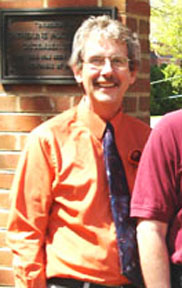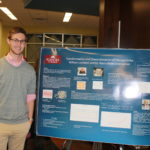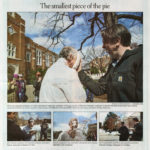Some of the reminisces that follow are true, but some are only partially true. That statement may seem obvious given the unreliability of human memory. However, in terms of mathematical logic (and, after all, I am writing about a mathematician) the phrase “partially true” may seem nonsensical. My intention, as I hope you will see, is for the statement to be self-referential, almost a pun.
Jeff Spielman died on Sunday, March 10. He was a longtime colleague and friend. We worked together at Roanoke College for 28 years. My sadness over his passing is a longstanding sadness, as the intelligent and funny man I worked with for so long had been lost in dementia for several years.
In happier times, Jeff arrived at Roanoke the same year I did. He was hired as the senior mathematician, I as the junior. He thought that was quite funny for a few years, then we got old enough that neither of us wanted any kind of “senior” label. We were often mistaken for each other. Maybe all mathematicians with moustaches look alike. Together we got math majors doing independent studies, we got grants to do technology workshops for local high school teachers, and we reshaped the mathematics curriculum. We spent way too much time talking about sports.
Jeff brought exploratory data analysis into our traditional statistics courses and helped design a successful statistics concentration. But I remember him best for his “Dr. Fuzzy” persona. His hair could get curly when he needed a haircut, but the reason for the nickname (to be honest, this was not widely used) was his work with fuzzy logic. Years later, fuzzy logic is now known as a populist reworking of probability and not anything important mathematically. Back in the day, it was a hot new field used by various industries to solve difficult problems. Smart washing machines that responded to the amount of dirt in the water, control systems for ultrafast trains, and other complex systems were going to be transformed by fuzzy logic.
In fuzzy logic, a statement is not necessarily true or false. Each statement has a truth value. A statement like “Jeff loved the Pittsburgh Steelers” would have a truth value of 0.95 (almost completely true), while a statement like “The Steelers are lovable” might come in with a truth value of 0.1. The truth values are similar to probabilities, and make up the components of loosely phrased common sense rules like “If you are approaching a turn at high speed then slow down.” The mathematics of combining statements with logical operators AND, OR, and NOT is consistent and produces good results. Jeff taught courses, supervised independent studies, and gave talks on fuzzy logic.
Unfortunately, the statement “Jeff had good health” would not have a large truth value. He battled epilepsy as a child, and blamed years of epilepsy medicine for his later cognitive difficulties. Early in his Roanoke career he went into the hospital with kidney problems. Plans to remove the infected kidney were abandoned when it was found that he had been born with just one. Jeff always found the humor in these difficult situations. It was sometimes discomforting to hear him joke about such things, but in the end the truth value of “enjoy life while you can” has to be high. Keep smiling, Jeff.











